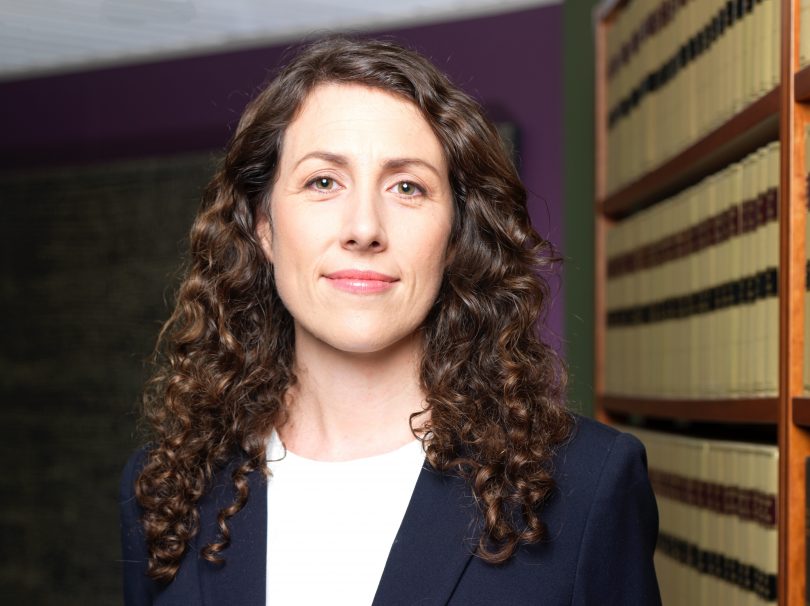
MEJ Lawyers special counsel Kate Waterford’s desire to change the world is firmly focused on helping people whose lives have been devastated by birth trauma. Photo: MEJ Lawyers.
Championing causes and speaking for people without a voice is something of a family trait for Canberra lawyer Kate Waterford. As the daughter of Jack Waterford, the legendary former editor-in-chief of The Canberra Times, Kate has inherited a desire to help people and also acquired her father’s love of books.
Kate recently purchased the Waterford’s family home from her parents, and with it, Jack’s extraordinary collection of around 25,000 books.
“The books came with the house, and while my husband says there may be too many of them, I enjoy reading the same books I treasured as a child to my own daughter,” she says.
From a lineage of multiple law degrees – both Kate’s parents studied law, as well as family members in previous generations – she says studying law was always to be her natural first step.
“My parents didn’t study law to practice,” says Kate. “It was more for the skills and understanding, however I wanted to change the world.”
As special counsel at MEJ Lawyers specialising in birth trauma and injury law, Kate’s desire to change the world is firmly focused on helping people whose lives have been devastated by birth trauma. But like many successful people, her career path has been circuitous, shaped by taking risks, a lot of hard work, and a little serendipity.
After studying arts/law at the University of Sydney, Kate left Australia to travel extensively through Europe and Asia. Although her time abroad was not all a holiday – she spent three years teaching law in a remote location on the east coast of India
“Working in India was definitely a culture shock for the first six months,” she says. “I had to learn a new language in a country that was a little intimidating, but the people made me feel so very safe and welcome.”
On her return home to Canberra, Kate says she took a ‘temporary job’ at MEJ Lawyers, where she had previously worked as a paralegal when she was an undergraduate.
“They asked me to come back to work for them and I am still here,” she says.
Starting with the medical negligence litigation team, and as a new mother herself, Kate was touched by the stories of women seeking help, and was drawn towards cases where she could help with the consequences of birth trauma and infant injury.
“While birth is often portrayed as a joyful experience, many women suffer awful physical and psychological trauma in pregnancy or labour,” explains Kate.
“Women who have experienced personal and traumatic injury have sometimes not even told their partner or their friends the extent of what they have experienced, or what they live with.”
Research suggests one in three Australian women identify their birth as traumatic. Kate says while a traumatic birth may not be enough to have a legal case as “you have to be able to prove there was negligence”, she encourages all women to seek help and advice.
Now one of only a handful of Australian lawyers specialising in birth trauma and injury, Kate says much of her role is part detective work.
“There is a lot of research and speaking to clinical experts to build a case,” she says. “These days, I have an extensive network of clinical contacts who can prepare reports for my cases.”
Committed to being a big-picture problem solver, Kate is also working across extensive networks committed to providing safer birth and better healing from birth-related trauma.
She has served as vice-president on the board of Amnesty International Australia; a director on the Physiotherapy Board of Australia; and is active on the boards of the ACT council of the Australian Institute of Company Directors, Corryong Health and the AusCam Freedom Project, a non-government organisation operating education centres in Cambodia to combat teenage sex trafficking.
Clearly not content to rest, Kate is currently completing her PhD in human rights law at the Australian National University, and chairs the Australasian Birth Trauma Association (ABTA).
It is her work with ABTA that she is clearly passionate about. The ABTA works to support families who have experienced birth trauma for safer births and better healing.
Kate recently joined Walk N Talk in support of the organisation.
“Anyone can experience birth-related trauma: people giving birth, their partner, family, friends, and even health professionals,” she says.
“It’s likely that you know someone who has experienced birth-related trauma, even if they haven’t spoken about it before.
“For too long, women and families have suffered in silence, but the power is in sharing our stories and using our voices so other people don’t need to walk this journey alone.”
For more information, visit Australasian Birth Trauma Association and MEJ Lawyers.
This is a sponsored article, though all opinions are the author’s own. For more information on paid content, see our sponsored content policy.












